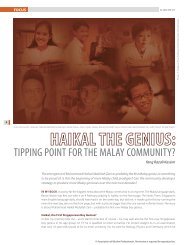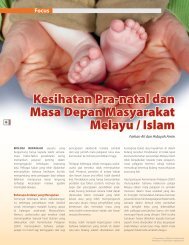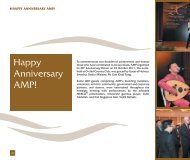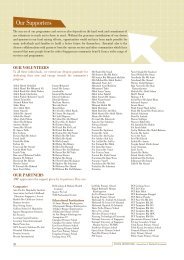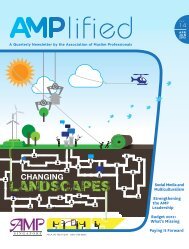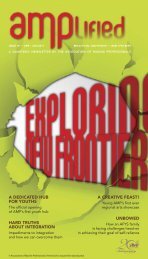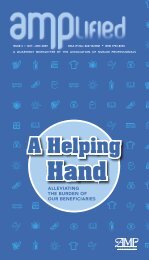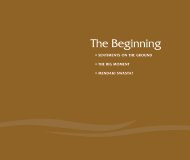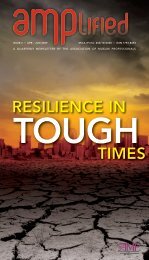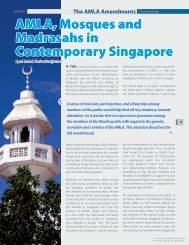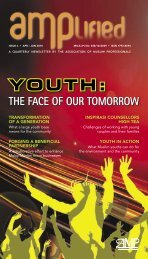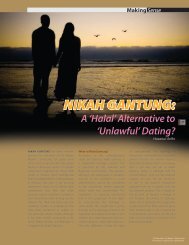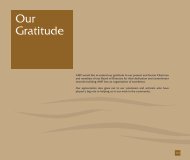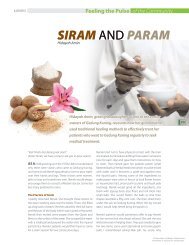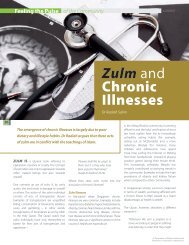The AMLA Amendments - Association of Muslim Professionals
The AMLA Amendments - Association of Muslim Professionals
The AMLA Amendments - Association of Muslim Professionals
Create successful ePaper yourself
Turn your PDF publications into a flip-book with our unique Google optimized e-Paper software.
<strong>The</strong> <strong>AMLA</strong> <strong>Amendments</strong><br />
Socio-Economy<br />
KARYAWAN<br />
PHOTO: AMP<br />
16<br />
MUSLIMS<br />
AND<br />
FINANCIAL<br />
PLANNING<br />
Sadali Rasban<br />
Excerpts <strong>of</strong> remarks at the<br />
Karyawan Forum on <strong>AMLA</strong>.<br />
FINANCIAL PLANNING<br />
covers a wide area. Protection<br />
is one, growth is another.<br />
<strong>The</strong>se two areas are provided by<br />
insurance and investment. <strong>The</strong>y<br />
are however not covered under<br />
<strong>AMLA</strong>. It is up to the individual<br />
himself – to manage his money,<br />
Sadali Rasban<br />
to make it grow and to protect it.<br />
Another aspect is purification, which is the zakat component. I believe<br />
zakat is a strength <strong>of</strong> the <strong>Muslim</strong>s but for some reason, it has not been<br />
fully enforced.<br />
I’ll give you an example. Your CPF is actually zakatable, so if it is<br />
enforced, the <strong>Muslim</strong> community’s fund can be as much as $75<br />
million a year. That is assuming that every <strong>Muslim</strong> has at least<br />
$20,000 in his or her CPF account. <strong>The</strong> zakat for $20,000 is $500 a<br />
year. $500 multiplied by the work force <strong>of</strong> 150,000 <strong>Muslim</strong> workers<br />
is $75 million a year. This is the potential strength <strong>of</strong> the <strong>Muslim</strong>s. If<br />
this is implemented, economic capacity will not be a problem for<br />
the community.<br />
Estate Planning<br />
A major issue I see is the management <strong>of</strong> estate matters. First, <strong>Muslim</strong><br />
law. <strong>The</strong>re is a serious misconception <strong>of</strong> <strong>Muslim</strong> law in Singapore,<br />
especially on estate matters. Often, we are told to look at <strong>AMLA</strong> as<br />
a reference point. <strong>AMLA</strong> mentions that the estate <strong>of</strong> <strong>Muslim</strong>s must<br />
be disposed <strong>of</strong>f under <strong>Muslim</strong> law. But <strong>Muslim</strong> law comprises many<br />
things such as Hibah (gift), Nazar (vow), Wasiat (will), Faraid (intestate<br />
succession law for <strong>Muslim</strong>s), Iqrar (pledge), Amanah (trust), etc. All<br />
these can be found in the Quran, Hadith and other Islamic sources<br />
<strong>of</strong> <strong>Muslim</strong> law which <strong>AMLA</strong> defines. However, it is not specific.<br />
Today we perceive <strong>Muslim</strong> law to be only Faraid and Wasiat. We also<br />
tend to overlook “Harta Sepencarian” (jointly-acquired properties). This<br />
is unique and mentioned in both the Quran and <strong>AMLA</strong>. It is practised in<br />
the neighbouring countries, but not in Singapore. “Harta Sepencarian”<br />
is the wealth accumulated by a couple during their marriage. When<br />
the husband dies, the wife technically gets half the property before it<br />
goes through the <strong>Muslim</strong> law <strong>of</strong> estate distribution, or Faraid. But this<br />
is not practised, although there are provisions.<br />
Another important point with regards to the law is that it focuses<br />
only on the distribution <strong>of</strong> the estate, or the breakdown. <strong>The</strong> Quran<br />
however very clearly stipulates who gets how much exactly. However,<br />
we do not go back to the Quran when it comes to the responsibility<br />
that goes with the inheritance. So while we implement the <strong>Muslim</strong>



